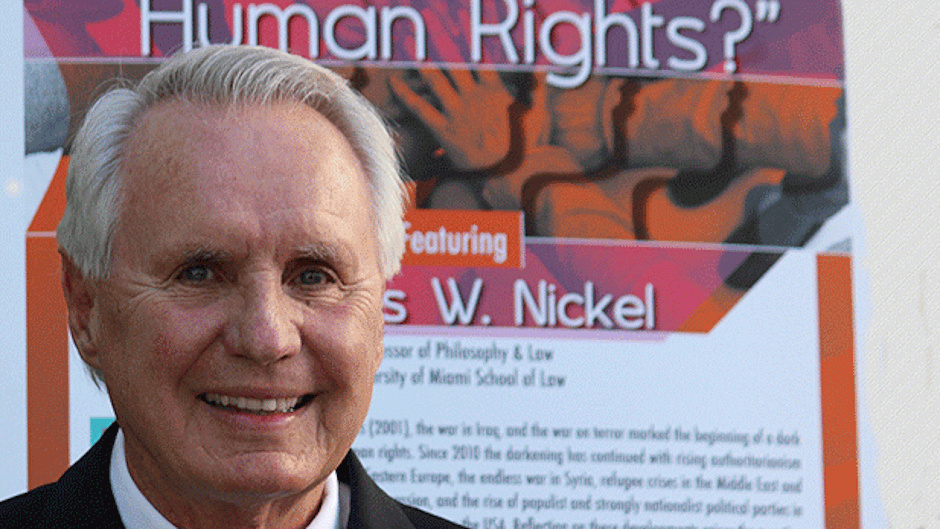James W. Nickel, renowned Professor of Philosophy and Human Rights, spoke at the 6th Annual Louis Henkin Human Rights Lecture. His talk, titled “What Future Human Rights?” was half review and assessment, half “fortune teller” predictions for the next 30 years.
“In 2048, the Universal Declaration of Human Rights will turn 100; perhaps we’ll still be celebrating it,” said Nickel.
How Concept of Human Rights Has Gained Acceptance
Nickel said that the international human rights community has been successful at creating broad awareness and acceptance of human rights concepts; there is some knowledge of and support for the concept of "human rights" in nearly every nation in every corner of the world.
The other benchmarks of success according to Nickel, are very much a work in progress. “What would success look like? Well, [first] you’d have broad acceptance from governments and private individuals, [second] you’d have compliance—a low level of violation—and, thirdly, robust international institutions to promote and protect from violations in every region.”
Still Work to Do - Ensuring Compliance Amidst Growing Authoritarianism
Nickel indicated that though we have achieved broad acceptance, we have much work to do to ensure compliance and robust international institutions. Nickel discussed the significant threats to the advancement of human rights that have plagued humanity for centuries—political instability, ethnic cleansing, failed states, economic downturns—alongside grave new challenges that will impact human rights, especially the effects of global climate change.
He also examined the growing—and modern—authoritarianism in China and the rejection of political rights and fundamental freedoms such as freedom of speech, assembly, participation, and the press presents an additional challenge to the global advancement of human rights.
Current Movement Led by Web of Human Rights Institutions
Nickel’s “crystal ball” predictions for the next decades include a continuation of much of the same: a complex and fragmented international human rights movement led by significant institutions that survive until at least 2048. He said the ongoing support of democratic nations and the continued reliance on outside institutions that use primarily non-coercive means to keep offending nations ‘in check' also were signs of a strengthening environment.
Nickel said that while the fragmentation of the international human rights system appears a weakness, it is also a feature which makes the endurance of the system much more likely.
“There are many different institutions and treaties, hundreds of NGOs that work on human rights—like Human Rights watch and Amnesty [International]” he said. This makes the system complex and unwieldy, but it also helps ensure longevity because if one organization collapses, “other regional institutions will remain. We have well-established regional systems [that are] well-entrenched. The complexity and fragmentation of the system has the advantage that some parts can survive even if other parts crash,” he said.
Hope for Future Growth of Human Rights Movement
Though some predictions were quite dark—including the increasing authoritarianism and rejectionist attitude in China potentially spreading to other nations, Nickel also expressed cautious optimism that the international human rights movement’s “steady progress is far from over” and highlighted some areas where progress has been strong; for example, “we’ve made great strides in women’s rights and LGBT rights.”
It is unclear whether our success in creating strong popular acceptance of human rights will be a saving grace concerning increasing authoritarianism. Though the United States and other western powers have long been in the business of helping to secure human rights, and this will likely continue, there are limits on what international organizations can achieve.
“We must persuade through non-coercive measures, through [the] embarrassment [of an offending nation] or not being able to get some financial assistance. . . but [the international system] isn’t like a good domestic legal system where you have lots of coercive rules.” Nickel quoted Henkin stating “The U.S. is not a cornerstone of human rights; it’s more like a flying buttress, supporting from the outside.”
Seminal Evening for Professor Nickel, Leading Academic in Human Rights Law
The evening was both lecture and a change in direction for Nickel. Nickel is retiring in a few weeks at the end of the 2017-2018 academic year.
Nickel taught and wrote in human rights law and theory, political philosophy, philosophy of law, and constitutional law, following in the footsteps of his former teacher and “father of human rights” Professor “Lou” Louis Henkin, after whom the lecture series is named.
Nickel enjoyed research fellowships from Corpus Christi College, Oxford; the Rockefeller Foundation; the National Humanities Center; the American Council of Learned Societies; and the National Endowment for the Humanities.
From 2003-09 Nickel was a professor of Law at Arizona State University where he was also an affiliate professor in the Department of Philosophy and the School of Global Studies. Before that, he was a professor of Philosophy at the University of Colorado, where he directed the Center for Values and Social Policy from 1982 to 1988, and chaired the philosophy department from 1992 to 1996. He has held visiting posts at the Georgetown University Law Center, the University of Utah, and UC Berkeley Law School.
The Universal Declaration of Human Rights in 1948 established the field of human rights. Over the last 70 years it has amassed theorists in areas ranging from law and political philosophy to sociology to economics and even biology. As the author of several seminal texts on human rights, explicitly Making Sense of Human Rights (1987), Nickel stands out. He is also the author of more than sixty articles in philosophy and law journals including the Columbia Law Review, Ethics, the Philosophical Quarterly, Philosophy and Public Affairs, and the Yale Journal of International Law. His essay, "Poverty and Rights," received the 2004 Essay Prize from Philosophical Quarterly.
Nickel by his prefatory remarks, including a half-joking, “I can’t wait to retire” appears ready to pass the torch after a fifty-year career devoted to human rights scholarship.
More on human rights law at Miami Law.

